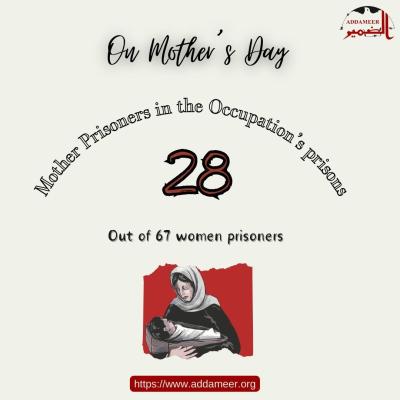
On Mother's Day, the occupation authorities continue to deprive 28 Palestinian mothers from staying with their children, as the occupation arrests 67 female prisoners in its prisons until today under extremely difficult conditions. This year has been one of the bloodiest years for mothers and women amid the comprehensive aggression and genocide against the Palestinian people in all places, where Palestinian women and mothers are subjected to various forms of systematic and serious abuses of their rights, particularly the female prisoners.
The journey of suffering begins for Palestinian mothers from the moment of the first arrest, which often occurs late at night when homes are violently raided. Mothers are frequently arrested and tortured in front of their children. The suffering continues during transportation to detention and interrogation centers, and later during their prolonged imprisonment, separated from their sons and daughters.
In related context to Mother's Day and throughout the years of occupation, the occupation authorities also prevent hundreds of Palestinian mothers from visiting their children in occupation prisons, whether on the pretext of security reasons for the prisoner or their families. This is in addition to the treatment endured by the mothers of detainees and prisoners, which is devoid of dignity at military checkpoints as they make their way to the prisons. They are subjected to humiliating searches at times by female soldiers of the prison service and inhumane treatment from guards and soldiers. It is worth noting that the occupation suspended prison visits since October 7th and isolated prisoners completely from each other. Furthermore, a policy of arresting mothers and women as hostages to pressure their children into surrendering to the occupation army has emerged recently. Prisoners' institutions have been able to document several cases of mothers being arrested by the occupation army and detained to pressure their relatives into surrendering themselves.
Despite all this persecution and oppression against Palestinian women, the conditions have worsened in the prisons holding female prisoners specifically after October 7th. Since the beginning of the aggression against the Palestinian people, female prisoners have been living in tragic and extremely difficult conditions. The majority of female prisoners are held in Damon prison, where they face harsh and difficult detention conditions due to the policy of collective isolation imposed on prisoners in occupation prisons from the outside world and from other prisons and sections after October 7th. Additionally, female prisoners, especially during the initial period after October 7th, have been subjected to widespread assaults, including solitary confinement, assaults by suppression forces, confiscation of all their belongings, deprivation of all their rights, as well as the policy of starvation and thirst still being practiced by the prison service administration against female prisoners and prisoners in the prisons. Moreover, there have been incidents of harassment, strip searches, and verbal abuse including insults and curses.
Since the beginning of the aggression and genocide and with the occupation's ground invasion of Gaza, widespread arrests of women from Gaza, including mothers, have been carried out. They were detained in military camps opened by the army to detain prisoners and female prisoners from the Gaza Strip, in addition to Damon prison. In this context, the occupation continues to commit the crime of forced disappearance against prisoners and female prisoners from Gaza, as prisoner institutions do not have any clear data on the numbers of detainees from Gaza until now. With the releases that have occurred for dozens of female prisoners from Gaza, harsh testimonies have been conveyed about their arrest operations, their transfer to camps, and what they have been subjected to in terms of humiliation, torture, deprivation of all their rights, threats of rape, forced humiliating strip searches, harassment, as well as the use of abusive language and insults deliberately by occupation soldiers, and forcing them to remove their hijab throughout the detention period.
Addameer confirms that the practices of the occupation against prisoners and female prisoners constitute war crimes. It calls on the Prosecutor of the International Criminal Court to immediately pursue the occupation authorities for their crimes, in order to halt the series of atrocious violations perpetrated against prisoners and female prisoners, and to prevent the occupation authorities from escaping punishment.